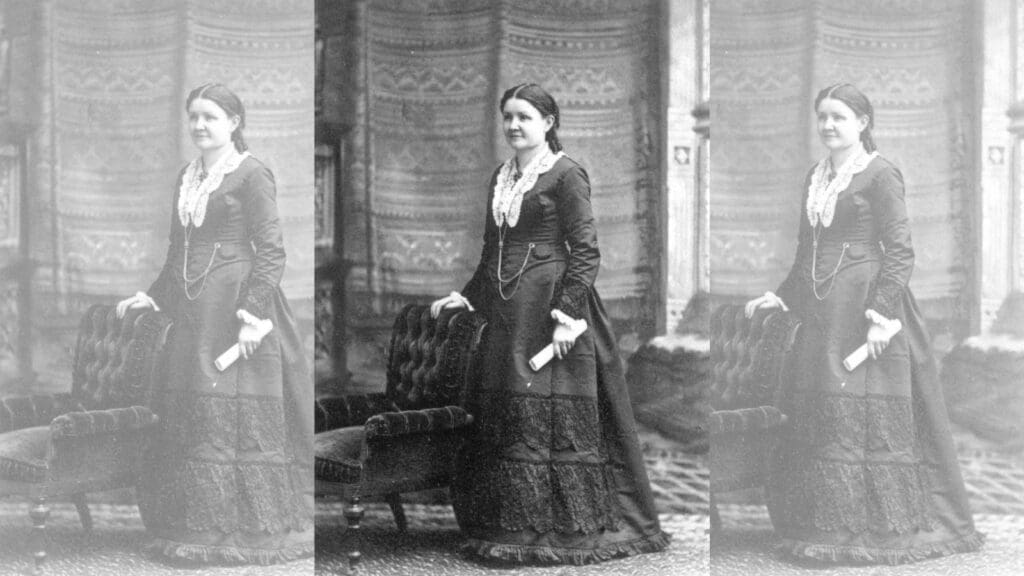
The CDC Buried a Measles Forecast That Stressed the Need for Vaccinations
March 28, 2025
How will Trump’s executive order affect the Smithsonian?
March 28, 2025Carrie B. Kilgore’s story is a reminder: that while the arc of the moral universe is long, and allegedly bends towards justice, how we deal with defeat and loss in the interim is perhaps just as important.
I recently spoke with students at the University of Pennsylvania Law School Women’s Association at their annual Carrie B. Kilgore dinner—a gathering of budding lawyers and their professors united in honoring the first woman to attend the Penn Carey Law School and be admitted to the bar in the Commonwealth.
Giving this speech was a pleasure, not only for the opportunity to encourage and support some of the great lawyers and judges of tomorrow, but because it brought me into contact with the life of Carrie Kilgore—a name, I have to admit, I had never heard before.
In the research for my remarks, I discovered that Kilgore was a doctor, lawyer and early suffragist, and while known to an extent in the Pennsylvania legal community, her papers have largely been unpublished, and her achievements largely unknown to the public. This is a shame—not only did she live a fascinating, meaningful life, but I think there are lessons that we can take from it as we confront the urgent challenges of the present moment.
The crux of my research centered around Kilgore’s work in 1871, where she took two major actions considered radical at the time.
First, she tried to earn admission into Penn’s Law School. In 1871, it was seen as unacceptable, even unconscionable, for a woman to practice law in Pennsylvania. The Dean of the school went on record saying that he would rather resign than allow a woman or a Black person to attend the institution. It took a decade of persistent lobbying, and more than one dean to resign, for Penn’s law school to finally allow her to matriculate.
That wasn’t the end, however, of Kilgore’s fight to practice law. After graduating, it took more years of lobbying for Kilgore to gain admittance to practice before both the Pennsylvania Courts of Common Pleas and the Supreme Court of Pennsylvania.
The second action she took in 1871 was that she tried to vote. She was, of course, refused at the ballot box, and decided to sue, representing herself pro se before an escalating series of courts, finally ending up at the Pennsylvania Supreme Court to make her case.
At the Court, she passionately advocated for her right to vote, and the justices heard her plea, but did not listen. The Court did not even bother to hear arguments from opposing counsel before rejecting her petition.
While it was likely no surprise for her, I can’t imagine the disappointment and frustration she must have felt at the time. Carrie Kilgore showed a level of moral clarity and courage in 1871, and indeed throughout her life, but was constantly met with failure. Judges who refused to listen. Men who denied her, at every opportunity, the access and privileges of citizenship and participation within law. To be Carrie Kilgore was to envision a future, which, dying ten years before the passage of the 19th Amendment, she would never participate in.
I think a lot about the status of righteous political causes today—how it feels like the focus and vision that has carried them throughout my life and career seems to be foundering. The wins become fewer and farther between, and the reactionary forces that would sooner have us back in 1871 than more an inch forward feel endlessly ascendant.
Hard-won rights that we thought were inviolable, like the right to abortion established more than 50 years ago in Roe v. Wade, have been stripped away, and others are on the chopping block. The rule of law in this country is at risk, and in some cases has already been severely compromised. Backlash to #MeToo, a movement I played a part in, is very real and immediate.
The question I ask myself: was all of our work for nothing, now that we face vicious backlash and find ourselves in a regressive political moment?
Kilgore’s story is a reminder—that while the arc of the moral universe is long, and allegedly bends towards justice, how we deal with defeat and loss in the interim is perhaps just as important. This is a moment of urgency. It demands clear-eyed attention and courage—even if the way forward is not immediately obvious.
This fight is different from the one we waged during the first Trump administration when many of us were out on the streets protesting. Now, we must be smart and strategic. We must recharge, find joy and support one another, but we cannot afford to check out. Our love for this country, for each other, and for future generations means we must stay engaged.
Just as Kilgore did not give up, despite the setbacks she faced, we must step up, mourn our losses and continue to do our part.
There’s one more story I think worth sharing about Kilgore. At 70, shortly before her death, she developed an interest in hot air ballooning and went for a trip in a balloon over Philadelphia. Her balloon tore at 3000 feet up, reportedly “grazing several rooftops” before a hard landing in the Schuylkill River.
Somehow uninjured, she expressed, rather astonishingly, excitement in going again. Carrie Kilgore’s unyielding, sometimes even joyful work is an inspiration—whether in the courtroom, at the ballot box or even in a damaged hot air balloon, she reminds us that failure is not an endpoint, but a call to rise again.
Great Job Debra Katz & the Team @ Ms. Magazine Source link for sharing this story.





